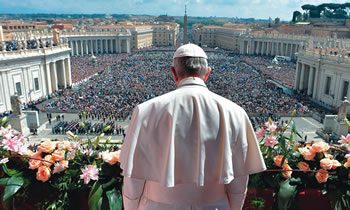Teaching about hope: the promise of Heaven
 ‘Paradise’ is one of the last words spoken by Jesus on the cross, addressed to the good thief. Let us pause a moment on that scene. Jesus isn’t alone on the cross. Next to him, on the right and on the left, are two evildoers.
‘Paradise’ is one of the last words spoken by Jesus on the cross, addressed to the good thief. Let us pause a moment on that scene. Jesus isn’t alone on the cross. Next to him, on the right and on the left, are two evildoers.
Next to Jesus there is also a self-confessed criminal: one who recognises he deserved that terrible torture. We call him the ‘good thief,’ who, arguing against the other thief, says, we are receiving the due reward for our deeds (see Luke 23:41).
Jesus, remember me ...
On Calvary, on that tragic and holy Friday, Jesus reaches the extreme point of his Incarnation and of his solidarity with us sinners. He fulfilled what the prophet Isaiah said of the Suffering Servant, “He was numbered with the transgressors” (Isaiah 53:12; and see Luke 22:37).
It is there, on Calvary, that Jesus has the last meeting with a sinner, to open to him also the door of His Kingdom. It’s interesting in that it is the only time the word ‘Paradise’ occurs in the Gospels. Jesus promises it to a ‘poor devil’ who, on the wood of the cross, had the courage to address to him the most humble request, “Jesus, remember me when you come into your kingdom” (Luke 23:42). He could not claim to have done good works, but he entrusts himself to Jesus, whom he recognises as innocent, good, so different from himself (v. 41). That word of humble repentance was enough to touch Jesus’ heart.
Trusting in God’s infinite mercy
The good thief reminds us of our true condition before God -- that we are his children, that he has compassion for us, that he is disarmed every time we give evidence to him of a desire for his love. In the rooms of so many hospitals, or in the cells of prisons, this miracle is repeated innumerable times. There is no person, no matter how badly he or she lived, for whom only despair remains, and for whom grace is prohibited. We all present ourselves before God with empty hands, somewhat like the publican of the parable who paused to pray in the back of the Temple (See Luke 18:13). And every time that someone, doing the last examination of conscience of their life, discovers that the deficits are greater than their good works, must not be discouraged, but trust in God’s mercy. And this gives us hope; this opens our heart!
God is Father, and He waits for our return up to the end. And as for the Prodigal Son who returns, who begins to confess his faults, the father shuts him up with an embrace (see Luke 15:20). This is God, and this is how God loves us!
God’s embrace of love
Paradise is not a dream place or an enchanted garden. Paradise is God’s embrace of infinite Love, and we enter it thanks to Jesus, who died on the cross for us. Where Jesus is, there is mercy and happiness. Without him there is cold and darkness. In the hour of death, a Christian says to Jesus, over and over, “Remember me.”
Everything ... transformed
in love
And if there isn’t anyone who remembers us, Jesus is there, next to us. He wants to take us to the most beautiful place that exists. He wants to take us there with the little or the lot of good that was in our life, so that nothing is lost of what he already redeemed. And Jesus will bring to the Father’s House all that is in us that still needs to be redeemed, the failures and mistakes of a whole life. This is the end for which we were created, when everything is fulfilled and is transformed in love.
Love, which will never end
If we believe this, death ceases to make us afraid, and we can also hope to depart peacefully from this world, and with much trust. And we can also repeat the words of the elderly Simeon, who was also blessed by his meeting with Christ, after a whole life consumed in waiting. “Now, Master, you may let your servant go in peace, according to your word, for my eyes have seen your salvation” (Luke 2:29-30).
And in that instant, finally, we won’t be in need of anything, there will be no more tears nor pain, we will no longer see in a confused way, and there will only be love, which will never end (See 1 Cor 13:8).
Source:
Zenit 25 October 2017, abridged and edited
 Entries(RSS)
Entries(RSS)